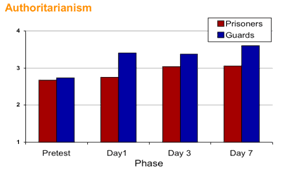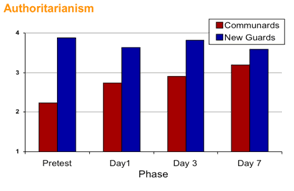Quantitative data
Analysis of participants’ authoritarianism indicated that this increased significantly (for both Guards and Prisoners) as the study progressed.

As a variant on this analysis, we examined authoritarianism as a function of the groups to which the participants assigned themselves at the end of the study (i.e., as ‘New Guards’ who proposed setting up a new regime or the remaining Communards).
This analysis revealed a significant statistical interaction between group and phase. This reflects the fact that the authoritarianism of the New Guards had not changed over time, but that of the Communards had increased significantly. So while at the start of the study those who subsequently became New Guards were significantly more authoritarian than the Communards, this was not the case at the study’s end.

- Source: Reicher, S. D., & Haslam, S. A. (2006). Rethinking the psychology of tyranny: The BBC Prison Study. British Journal of Social Psychology, 45, 1-40.
As the study progressed all the participants became more authoritarian
The participants who wanted to be the New Guards at the end of the study were those who had been most authoritarian at the study's outset; at the end of the study, though, their authoritarianism was representative of other participants' views

